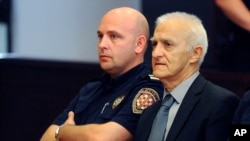Australia is accused of letting war criminals roam free with no risk of prosecution. It follows the sentencing by a Croatian court of Dragan Vasiljkovic, a former paramilitary leader, for the torture and killing of civilians and troops during the Croatian war. Australia chose to extradite Vasiljkovic, an Australian citizen, rather than prosecute him at home.
This week a court in Croatia found Dragan Vasiljkovic, also known as Captain Dragan and Daniel Snedden, guilty of the killings and torture of captive Croatian civilians and troops while he was a rebel Serb commander during the Croatian war in the early 1990s.
The defendant was born in Serbia before migrating to Australia as a teenager. He went back to the Balkans to train Serbian rebels in 1991, when they fought against Croatia's breakaway from what was Yugoslavia.
Vasiljkovic has always pleaded his innocence and was extradited by Australia to Croatia in 2015 following a 10-year legal battle.
Lawyers believe that he could have been prosecuted for his crimes in Australia, which has been accused of lacking the political will to put suspected war criminals on trial.
Professor Gideon Boas from the Latrobe Law School believes there could be hundreds, if not thousands of war criminals living freely in Australia.
“There is at least several hundred. There has been research to suggest that that is a low number, [it] could be in the thousands. The problem is that since the early ‘90s Australia has disbanded a special unit within the Australian Federal Police that investigated these crimes and as a result we really have no baseline at all to work from. All the resources are put in to terrorism and counter-terrorism, and there is really no interest or resources in pursuing war criminals in Australia,” he said.
Research has indicated that Australia is home to suspected war criminals from conflicts in the Balkans, Somalia, Sri Lanka, Sudan and Cambodia.
In the 1980s Australia did seek to prosecute alleged war criminals from the Second World War. Only a handful ever faced trial, and none was successfully prosecuted.




